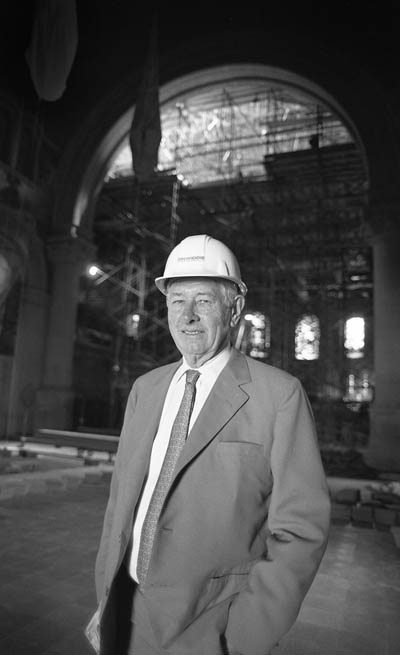Melvin B. Lane 1922-2007
Publisher and defender of California coast
Friends of the California coast lost one of our heroes recently. Melvin B. Lane, former owner and publisher of Lane Publishing Company and Sunset Magazine and Books, passed away recently at the age of 85. Among his many accomplishments, Mel led the California Coastal Commission from its inception in 1973 through the passage of the Coastal Act, establishing the commission as a permanent state agency. With his wry smile and sense of humor, Mel proved to be a visionary who left a mighty legacy for all of us.
The late ’60s and early ’70s were marked by a growing awareness of the need to conserve our natural resources for future generations, particularly along the coast, spurred in large measure by the devastating oil spill in the Santa Barbara Channel. In California, beachfront development was cutting off the public’s ability to even get to the ocean. After several unsuccessful attempts to pass coastal protection legislation in Sacramento, a group of intrepid and optimistic activists gathered signatures throughout the state and placed Proposition 20 on the ballot in November 1972. And it passed!

Proposition 20 set up one state Coastal Commission and six regional commissions, comprised equally of local elected officials and public members. In addition to reviewing and issuing permits for various categories of coastal development, the commissions were charged with preparing a plan to be submitted to the Legislature in 1976 defining critical coastal resources and detailing the Coastal Commission’s jurisdiction, structure, and relationship to local governments and other state agencies. However, if the Legislature failed to pass the Coastal Act, it would all vanish.
The early years of the commissions were marked by unprecedented public participation; precedent-setting litigation; never-ending philosophical and practical debates among developers, local governments, and commissioners; and the tricky interaction between regional commissions and the state commission. Everyone knew they were involved in something that was very important-something being monitored by coastal states throughout the nation-yet most participants were relatively new at the game, and there was no rule book to follow.
There’s no telling how it would have all turned out without Mel Lane. Mel was appointed to the state Coastal Commission as a public member by then governor Ronald Reagan. A conservative Republican who had chaired the San Francisco Bay Conservation and Development Commission (SFBCDC) in the ’60s, Mel already had a reputation as a conservationist with an uncanny ability to hear diverse views with an open mind, who proved to be extremely capable at reconciling conflicting interests and interacting with legislators. Mel and Joe Bodovitz, the commission’s executive director, presented a formidable duo in the halls of Sacramento, fending off threats to weaken the commission and making the case for passing the 1976 act, establishing the California Coastal Commission as a permanent agency.
One could say, “The rest is history,” but the true accomplishments of those years, with Mel at the helm, can probably never be appreciated fully. With his history of success in business and commerce, he delivered the powerful message that a healthy environment and a strong economy go hand in hand.
For me personally, the moves from citizen activist-gathering signatures and making shaky presentations before the commission-to being appointed to the commission in 1974, to serving under Mel’s chairmanship and ultimately assuming that position, to running for public office were all greatly influenced by Mel’s appreciation for the public’s role in the decision-making process and by his ability to encourage just plain folks to step up to the podium.
Santa Barbara County would look very different today if not for the Coastal Commission. It has been instrumental in helping to save coastal open spaces such as Ellwood Mesa and the Carpinteria Bluffs, redeveloping Stearns Wharf with limited development and open access, and guaranteeing the public’s right to get to the beach from Isla Vista to Rincon. The commission has repeatedly protected our coast from the devastating impacts of offshore oil and gas development. In 1999, for example, the commission successfully sued the federal government over the extension of 36 oil and gas leases off our coast. Most recently, the commission unanimously denied a proposal to construct a massive liquefied natural gas terminal off the coast of Oxnard.
Thanks to people like Mel Lane, we have one of the strongest laws in the nation protecting coastal resources and the public’s right to get to the beach. But Mel knew the coast is never really “saved”-the challenge is passed to each new generation. What he has left us with is a powerful tool, and a shining example of what true leadership looks like. Thank you, Mel.



